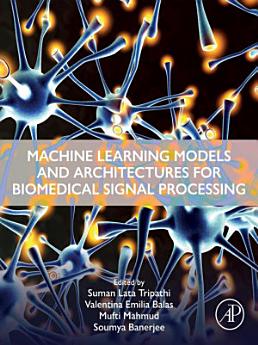Machine Learning Models and Architectures for Biomedical Signal Processing
About this ebook
About the author
Suman Lata Tripathi completed her PhD in the area of microelectronics and VLSI from MNNIT, Allahabad. She was also a remote post-doc researcher at Nottingham Trent University, London, UK in 2022. She is a Professor at Lovely Professional University with more than 19 years of experience in academics. She has published more than 89 research papers in refereed journals and conferences. She has also published 13 Indian patents and 2 copyrights. She has organized several workshops, summer internships, and expert lectures for students. She has worked as a session chair, conference steering committee member, editorial board member, and peer reviewer in international/national conferences. She received the “Research Excellence Award in 2019 and “Research Appreciation Award in 2020, 2021 at Lovely Professional University, India. She also received funded projects from SERB DST under the scheme TARE in the area of Microelectronics devices. She has edited or authored more than 15 books in different areas of Electronics and electrical engineering. Her areas of expertise includes microelectronics device modeling and characterization, low power VLSI circuit design, VLSI design of testing, and advanced FET design for IoT, Embedded System Design, reconfigurable architecture with FPGAs and biomedical applications.
Valentina E. Balas is a Professor in the Department of Automatics and Applied Software at the Faculty of Engineering, “Aurel Vlaicu University of Arad, Romania. She holds a PhD Cum Laude, in Applied Electronics and Telecommunications from Polytechnic University of Timisoara. Dr. Balas is the author of more than 350 research papers. Her research interests are in intelligent systems, fuzzy control, soft computing, smart sensors, information fusion, modeling, and simulation. She is a member of the editorial boards of several national and international journals and evaluator expert for national, international projects, and PhD thesis. Dr. Balas is the Director of Intelligent Systems Research Centre and Director of the Department of International Relations, Programs, and Projects in Aurel Vlaicu University of Arad. She is the recipient of the "Tudor Tanasescu" Prize from the Romanian Academy for contributions in the field of soft computing methods (2019).
Mufti Mahmud is an Associate Professor of Cognitive Computing at the Department of Computer Science of Nottingham Trent University (NTU). Dr. Mahmud was appointed to the USET, University Shadow Executive Team, in 2022, providing specialist input to the University Executive Team and Vice-Chancellor on strategic policy and direction matters related to Equality, Diversity & Inclusion (EDI). He is the Coordinator of the Computer Science and Informatics Unit of Assessment of Research Excellence Framework at NTU and the deputy group leader of the Interactive Systems Research Group (ISRG) and the Cognitive Computing & Brain Informatics (CCBI) research group. He is also an active member of the Computing and Informatics Research Centre (CIRC) and the Medical Technologies Innovation Facility (MTIF). He is a member of the NTU Distance Learning Governance, Operation and Steering committee as well as the International Mobility Committee and serves as an independent end-point assessor for the Level 6 BSc (Hons) in Digital & Technology Solutions Professional Degree Apprenticeship, and an expert of the online master's degree in computer science. He led the teaching of the Big Data and its Infrastructures (Postgraduate – on-campus and online delivery) module. He is a Fellow of the Higher Education Academy, a Senior Member of the Institute of Electrical and Electronics Engineers (IEEE) and the Association of Computing Machinery (ACM), and a professional member of the British Computer Society (BCS).
Soumya (SM-IEEE) was an invited Research professor and at present as Senior Associated Researcher at Conservatoire National des Arts et Métiers (CNAM), Laboratoire CEDRIC and INRIA–EVA (the French National Institute for computer science) Paris since November 2018. He is also the Chief Technology Officer of MUST-B2B, Paris, along with associated senior researcher activities and. Projects at INRIA, Paris, where he is developing of Deep hybrid learning based recommendation and unsupervised machine learning for business Eco-system and communication systems. In addition to, he is the director research & innovation of Trasna-Solutions, Arklow Ireland at their center of excellence with UCC Cork and Govt. of Ireland. He is having several projects and product implementation on private Blockchain, e-SIM and smart manufacturing & logistics. Prior to that he was senior Associate Professor, Computer Sc.& Engg., Birla Institute of Technology Mesra, India, vising research professor at CNRS –INSA de Lyon, Lyon, France (2016), Invited Research professor at TU-Ostrava, Cz Republic respectively (2015). He also spends several years with MSR Seattle, USA, in Cognizant Technology Solution, ICICI InfoTech both in India, southeast Asia and Europe almost a decade. Dr. Banerjee completed his Bachelors in Engg. (at present VNIT Nagpur) in Computer Sc. (Hons.), did his masters from IISC Bangalore (MS- Research) and Ph.D in Computer Science and Engg. from Birla Institute of Technology, Mesra, India on Stigmergic optimization with Hybrid Intelligence in 2008-2009. He has more than 130 international journal publications including 32 book chapters and 55 International top level conference proceedings published from Elsevier Science, IEEE Transactions, ACM, Springer– Verlag Germany, CRC Press, and Idea Publication USA to his credit covering machine learning, security measures, prediction and data analytics, bio inspired intelligence, soft computing and optimization, hybrid intelligence, social networking applications and social media, Wiki analysis, machine learning with complex system and evolutionary computing. He also guided more than 10 Ph.D scholars in India and abroad. Dr. Banerjee had also developed a new artificial agent known as emotional ant colony for crowd modelling with European patent. Now he is having a patent in process with French govt. of business recommendation and ML. He is also an active project participant and consultant in IRIDIA (The National Lab of Computational Intelligence), Belgium, and Simula lab. Norway. He was leading a project as academic consultant with Yahoo Research Spain, and also envisaged new project on graph mining on FaceBook Friends analysis network from FaceBook UK and Luxemburg. He is involved also in several technical consultancy at France with Netflix, Germany (University of Stuttgart) and Ireland.







